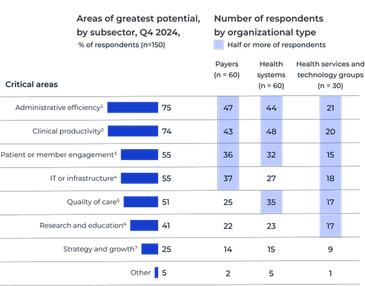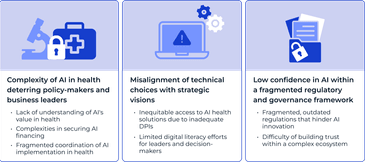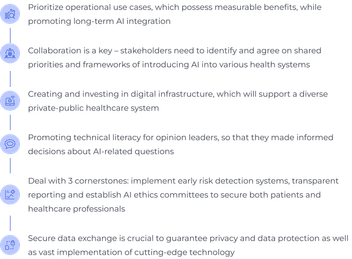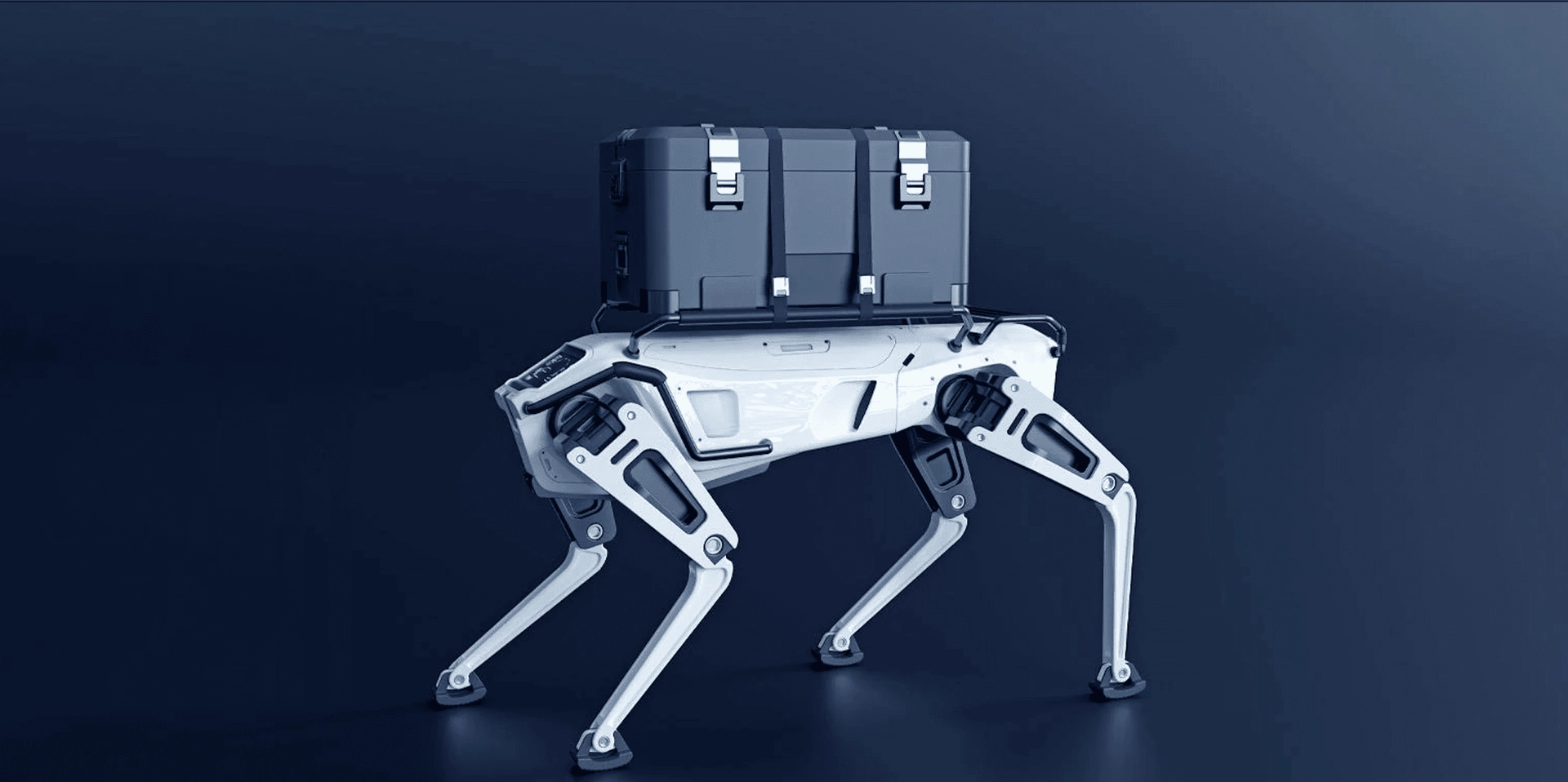Generative AI in Healthcare: Application, Advantages, and Key Challenges

Ruben Melkonian
CEO
Healthcare is one of the key industries, where AI implementation is crucial for everyone: payers and providers, healthcare services and technology (HST) organizations. Data analysis by McKinsey showed that nearly 85% of providers, payers and HST organizations are already exploring generative AI demonstrating a high level of interest in the sector.
Providers are looking to optimize routine work, payers – to improve patient care, whereas HST players seek to provide advanced tools for analytics and operational management. This tendency is reflected in clear market growth: between 2016 and 2023, usage of AI technologies in the healthcare market expanded from $1.1 billion to $22.4 billion, marking a 1,779% increase.
Such fast adoption highlights the strong need for AI integration.
Generative AI vs Traditional AI
Generative AI utilizes innovative algorithms to generate new data based on previously learned patterns. Analyzing vast information massive during their training, this model identifies certain structures and schemes of data organization. As opposed to traditional AI, which only analyzes existing data, such training enables generative AI to create new content based on the type of data it is trained on.
Consequently, traditional AI is used in the following medical scenarios:
- detect abnormalities on various types of radiological images;
- analyze the risks of a patient’s readmission or developing chronic disease;
- generate knowledge-based systems to be incorporated into electronic health records (EHRs) to inform about potentially dangerous drug interactions;
- support decision-making process for both diagnosis and therapy (like choice of antibiotics in case of bacterial infection).
Despite the fact these features led to improved efficiency and accuracy of medical diagnostics and medical management, they are limited to rough interpretation of already existing data.
Generative AI is capable of:
- generate summaries based on the clinician’s notes;
- create a discharge summary leading to the reduction of the physician’s administrative workload.
- generating patients’ medical histories for simulation training.
- Summarize clinical guidelines for decision support.
This unlocks multiple opportunities:
- for providers – reducing manual workload up to 70% by generating notes, discharge summaries, and other documentation;
- for medical consultants – preserved privacy of the patients by using AI-generated simulations;
- for IT vendors – strengthening diagnostic opportunities through developing AI-powered assistants, partnering with medtech companies for imaging solutions, cooperating with pharmaceutical corporations on AI-backed tools for accelerated drug discovery.
These are essentially necessary opportunities, which allow for not only progressive drug discovery, but also safe professional training without compromising the security of the patient’s data.
Сurrent Applications of Traditional AI and Generative AI in Healthcare
Currently, generative AI is being actively investigated or implemented in a number of healthcare processes. Document processing, professional training, drug discovery, personalized medical care, and medical screening – these are just a few directions of Gen AI use cases in healthcare with key stakeholders exploring perspectives of integrating this technology into various medical systems.
Administrative Effectiveness
Administrative routine continues to be a burden and a subtle cost-driver in healthcare. Taking up 40 to 50% of a physician’s time, it disrupts the idea of patient-centered care. AI algorithms structure information and eliminate the need for manual work, freeing time for patient interaction and clinical decision-making. Each party (healthcare providers, IT vendors or clinicians) benefit from the upgrade:
-
Providers acquire various notes and discharge summaries as well as referral letters, which are generated automatically based on doctor-patient interaction. It results in decreased documentation-oriented time up to 70%. In addition to that, automatization of the billing process allows for reduction of administrative errors.
-
Health IT vendors: LLMs (large language models), NLP (natural Language Processing) and entity linking are other invaluable tools for healthcare, which demonstrate how automated mapping of medical terms according to standardized taxonomies affects coding, billing and even research workflows. NLP aligned with entity linking is by far one of the best solutions for hospital management and operational task management.
-
Consultants: Gen AI provides support by performing audits and creating measurable roadmaps, which are tailored to both compliance and regulatory potential and existing needs.
Clinical Productivity
Generative AI enhances the ability to diagnose, plan, and organize treatment by analyzing vast amounts of data and transforming it into actionable steps.
- Providers acquire support in clinical decision-making by preparing drafts of radiology reports, generating synthetic CT/MRI images to reduce radiation exposure, and excluding potential misdiagnoses. Oncologists, for instance, can get AI-synthesized lab results or valuable genomics data, which may be used to suggest tailored therapies.
- Health IT vendors utilize deep learning techniques for the analysis of diagnostic images, predictive analytics for risk stratification, and as a supporting tool for decision-making embedded into clinical workflow.
- Consultants: integrate generative AI into care roadmaps, making sure it aligns with current clinical and ethical standards. It can also serve as a management supportive tool for physicians who are adopting new tools.
Patient & Physician’s Engagement
Modern healthcare systems highlight the importance of patient-centered care, which implies taking into account one’s medical, genetic, and lifestyle-specific features. Generative AI plays an essential role in suggesting proactive interventions, which may improve treatment results as demonstrated by our research.
- Providers utilize AI-backed virtual assistants and chatbots, which successfully manage appointment scheduling, FAQ’s and follow-up questions. It helps to save clinicians’ time in order to focus on solving complex cases and improving overall treatment adherence.
- Health IT vendors build platforms that combine patient portals and generative AI chat interfaces, which guarantee 24/7 support. Above that, AI can generate health education content tailored for patients with chronic conditions, which improves their disease awareness and lifestyle accordingly.
- Consultants: to advise healthcare providers on integrating generative AI tools, aligning them with patient satisfaction goals.
Medical Research and Diagnostic
Research paves the way to medical breakthroughs in both treatment and diagnosis. Yet it often struggles to offer timely solutions owing to the enormous amounts of data and analysis required to generate potential discoveries. Generative AI is able to analyze data from various sources (both organized and disorganized) and identify specific signalling molecules, proteins, or genes linked to specific diseases.
AI-based data analysis is able to change the dynamic and boost data recognition and usage to unprecedented levels, as demonstrated in a novel blood type classification solution. A model created for a company working with both private and public healthcare facilities utilized a number of factors, including demographics, complete blood count tests results, and patient history to guide oncologists toward more accurate diagnoses while reducing diagnostic failures.
AI Technology in Healthcare and Its Benefits
Nowadays, AI works like a catalyst for multiple spheres, whereas in the healthcare sector – how to diagnose and deliver medical care. Promising smarter approaches, generative AI strengthens the following:
- Personalized Approach. AI use cases in healthcare demonstrate that multidimensional healthcare analysis of various factors, including genetic profile, lifestyle, and medical history, provides an opportunity to create recommendations tailored to each patient’s clinical profile. Above that, AI encourages patients to take an active part in their treatment journey, instead of just being a bystander.
- Improved Efficiency. The usage of AI tools and specifically AI-assistants enables automation of routine administrative tasks while significantly reducing time for filling in/writing documentation. For example, advanced algorithms of personal assistants can integrate scattered data – from structured data to EMRs, PDFs, and even handwritten notes. It enables physicians to receive summaries and valuable visualized insights from a patient’s medical history without the need to rearrange the data themselves. As a result, healthcare workers get more quality time with patients, delivering personalized care.
- Cost-reduction. Apart from being a time-saving tool, generative AI in healthcare assists in saving costs by cutting out unnecessary procedures and tests as well as improving overall workflow and reducing administrative burden on the healthcare workers, which eventually leads to sufficient cost-reduction.
Usage of AI in healthcare is beneficial for all key elements in the healthcare system: healthcare workers, patients, stakeholders and health systems. It gives an opportunity to bring back a patient to the center of a healthcare model – an ideal model of medical care. When aligned with ethical standards and legislative procedures, generative AI can indeed redefine the future of healthcare.
Generative AI in Healthcare: Challenges and Debates
Despite active implementation of AI in certain healthcare domains, scaling its use across the healthcare sector faces solid barriers. Key challenges remain especially critical: lack of regulatory framework, misaligned technical execution and strategic vision, and complex concept of AI in healthcare deterring decision-makers.
Lack of Regulatory Framework
Outdated regulations alongside inconsistent governance and significantly varying standards across jurisdictions threaten trust and public recognition of AI for healthcare. Taking into account the absence of strict oversight, precise ethical guidelines and transparent validation processes, frustration and scepticism keep building, slowing adoption of the innovative technology.
Misaligned Technical Execution and Strategic Vision
Healthcare opinion leaders often rely on technical teams in technology-related decision-making processes. However, these teams are not invited into overlooking the whole system transformation. As a result, long-term objectives are oftentimes missed.
Instead of isolating technical teams to executive function only, it would be more beneficial to use AI as a catalyst for systemic changes on different levels, including operational efficacy, clinical outcomes, and patient care itself.
Complex Concept of AI in Healthcare Deterring Decision-Makers
Being in the media spotlight, generative AI in medicine still struggles. The field’s technical, conceptual, and regulatory complexity can be indeed intimidating for both policymakers. Our team also assumes the problem is in adoption from the C-level to ordinary workers.
Lack of clear correlation between AI capabilities and long-term health strategy, technology-driven enthusiasm often fails to translate discussions into measurable real-time actions. Our team also assumes the problem is in adoption from the C-level to ordinary workers.
Steps to Overcome AI-related Bias and Challenges
A few steps can be applied in order to overcome existing barriers and reduce biased perception of the potential transformative role of AI in healthcare:
Healthcare industry is one of the key spheres, where implementation of generative AI is vital to optimize work and reduce costs. In spite of the number of obstacles, such as lack of solid regulatory base and transparent vision of the AI role in complex patient-provider relationships, recent data suggest that more healthcare providers and health systems introduce AI-based technologies into routine practices.
In addition to that, more healthcare facilities are looking for ways to fill in the gaps of their functionality and competences by establishing partnerships with the opinion leaders in the AI sphere. Quantum is at the forefront of introducing AI solutions to the healthcare sector. By collaborating with hit vendors, consulting companies, and healthcare providers, Quantum helps to implement gen AI technologies into both operational and strategic processes on a day-to-day basis.
The Healthcare sector needs gen AI technologies for success and progress. Businesses that actively reassess their capabilities to align with the growing need of AI implementation in healthcare are going to achieve the best results. Leaders should cooperate with AI experts and define their technology-driven strategy, which enables the successful implementation of the technology.
AI Consulting
We help define relevant use cases, assess data readiness, and build AI adoption roadmaps to ensure regulatory alignment, cost-effectiveness, and measurable impact.
Check the service















